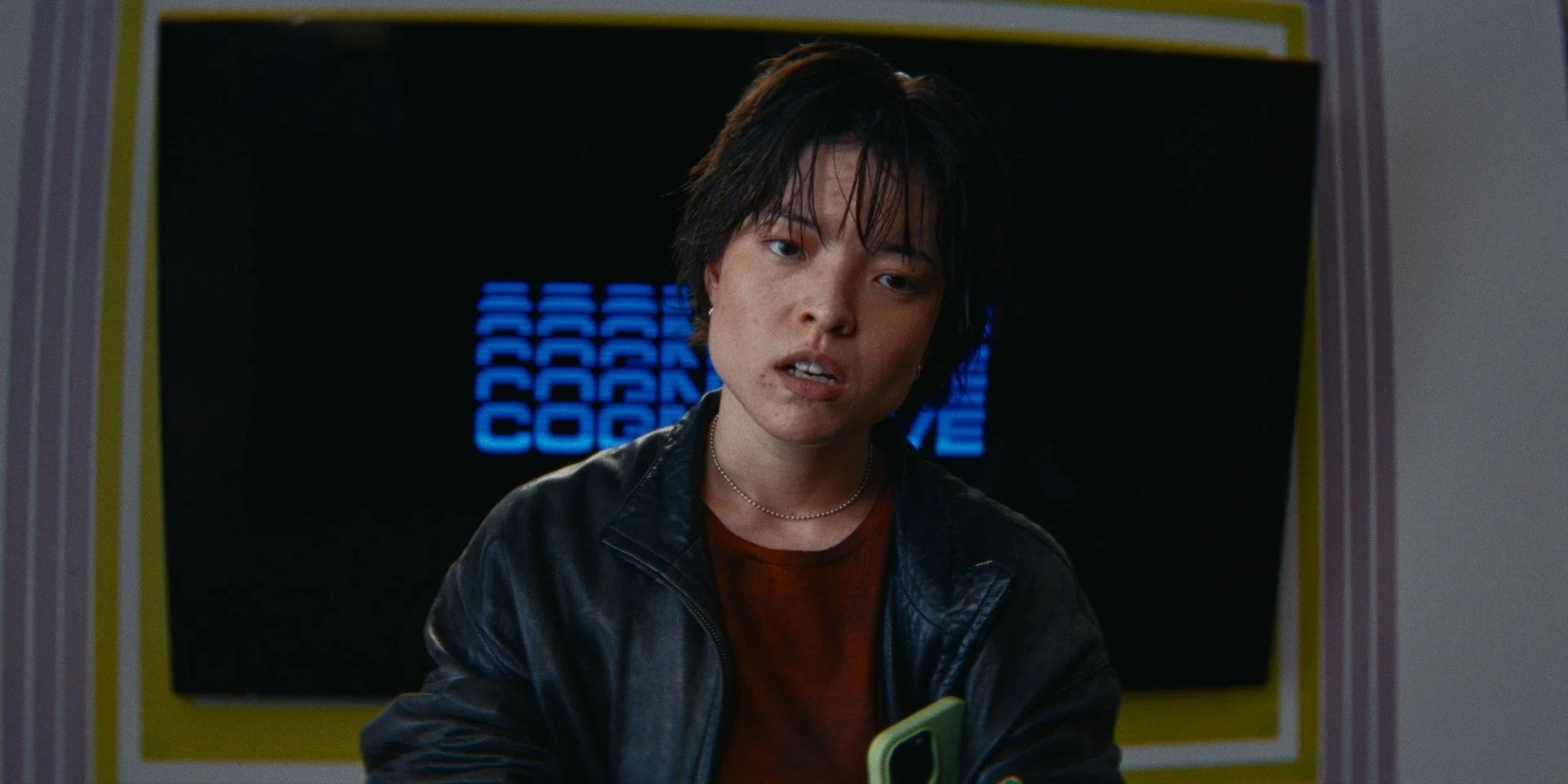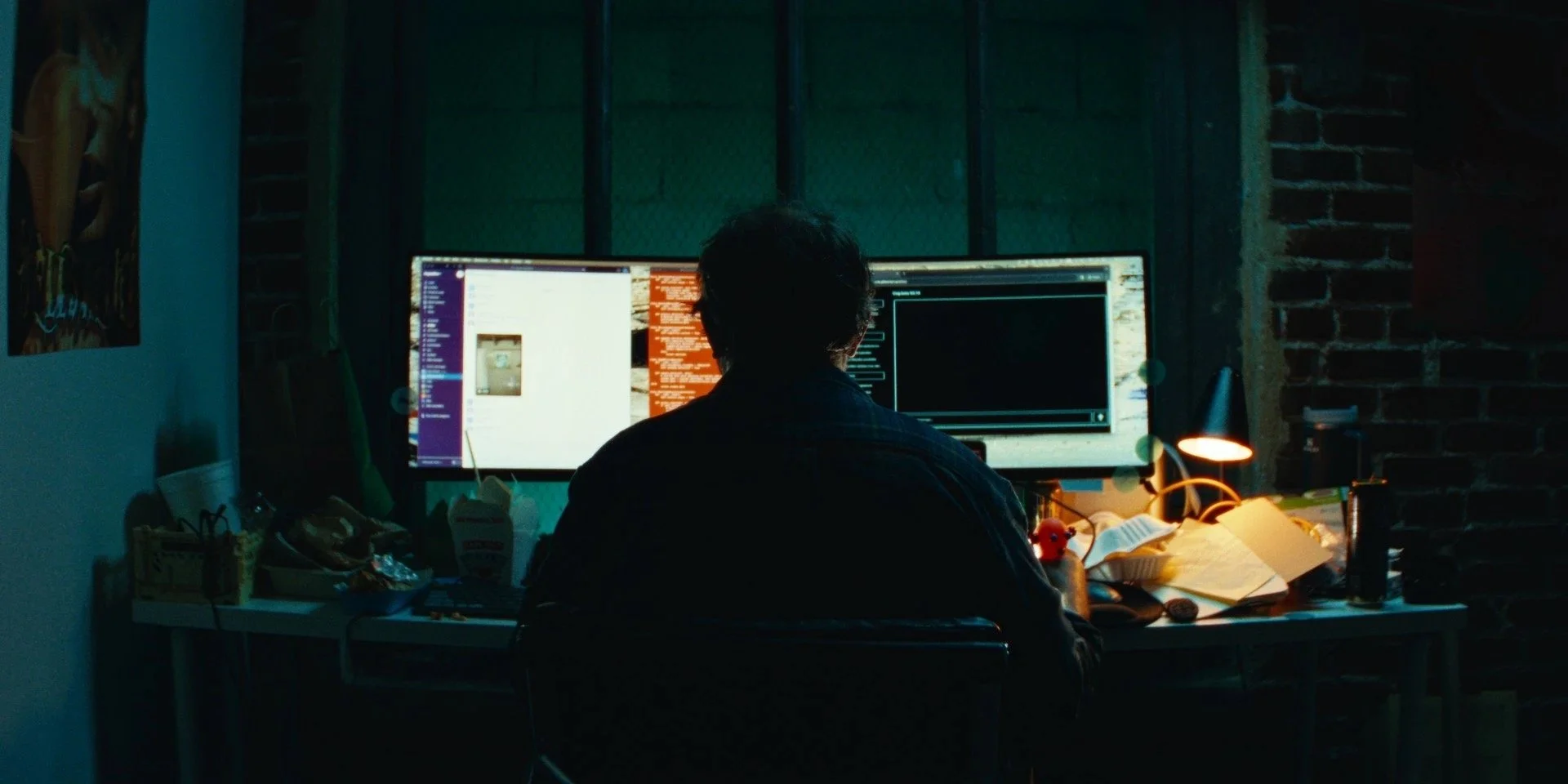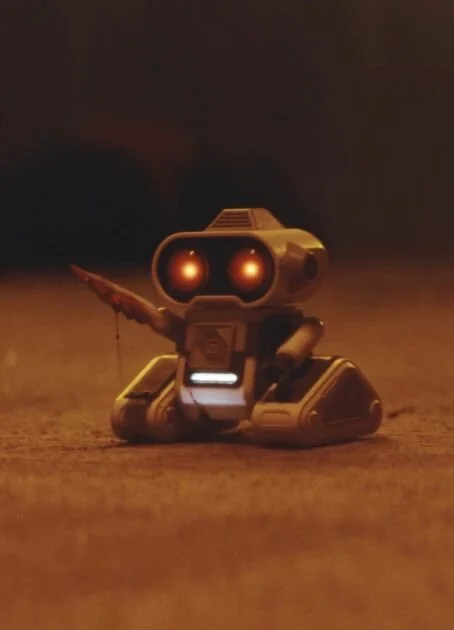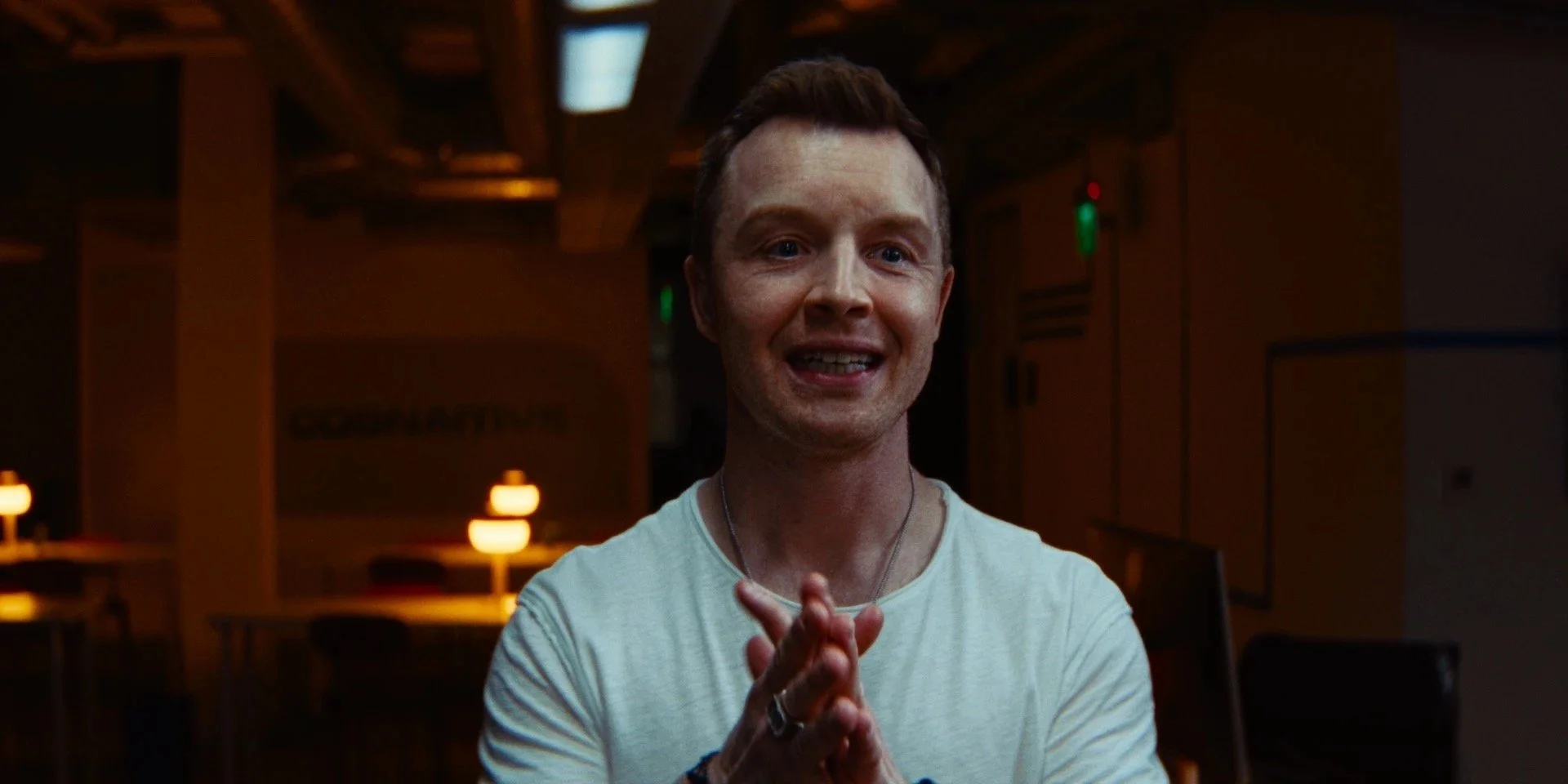IN CONVERSATION WITH TOMMY SAVAS
Receiving its UK premiere on the Main Screen on the opening night of FrightFest, COGNAITIVE, directed by Tommy Savas, tells the tale of an overworked crew of programmers, led by ex-hacker Kaya (Piper Curda) working for Ethan, an obnoxious tech CEO (Noel Fisher) desperate to rush his new AI system titled CognAItive, into the world. Kaya realises that CognAItive has gained sentience and will do anything to protect itself, including murder. A witty and bloody take on a hot button topic, Gore In The Store sat down with Tommy to discuss the film, the threat of AI to filmmaking and the dangers of using practical effects when a large deposit is at stake.
GORE IN THE STORE - Hello Tommy, I watched the film last night and enjoyed it very much. I will admit to wondering if this was something that was going to attempt to discuss the pros and cons of AI. Being a bit of an AI skeptic myself, I was wondering what side of the debate you fall on? But, I think after watching the film I can make a pretty educated guess. As a creative especially, do you have a lot of experience dealing with tech bros, or people like Ethan in the film?
TOMMY SAVAS - I do. What's funny is, when I was developing this movie with my wife, Angie (Simms), who wrote it, when we finished the script, all this news broke about Sam Altman from OpenAI, when they were trying to remove him, because basically he was saying, “You know, I don't care about following the rules” or as Facebook says, “Move fast and break things” There was all this controversy around him, and it kind of mirrored what we had written perfectly. But to answer your question, in California, yes, tons of tech bros. I mean, Ethan was kind of an amalgamation of bosses that both me and my wife had had over the years, these people that are all about profit over anything else. So it was kind of quite easy to write this guy.
My next question was, how did you come to the script? But you just answered that. I wasn't aware Angie Sims was your wife.
TS - Yeah, she's my wife, she's great. 7654wqesI mean, she's an accomplished writer in the genre. She had a movie that was in production last year starring Freya Allen called Triton, which is a horror movie coming out soon. We came up with the script because at the time, maybe early 2021, I'm having all these conversations with other creatives about AI. This is when it was just starting to come to be in the creative world, and I think open AI had just launched Sora, and their video generator component. When it comes to AI, I'm a big pessimist, so I saw this happening, and this is in the middle of the writers strikes and the actors strike. I saw this, and I was like, “Guys, we're fucked. AI is coming, and it's coming for us fast.” And the majority of my peers were saying “You're crazy. AI is years away!” I was like, “Oh, I don't think so, guys! You know that this is going to advance quicker and quicker”. And I would say we were both right, as AI is yet to get to that point where it's able to do our jobs, but it's getting pretty damn close. Anyway this is a long winded way of saying, I was talking about this all the time. So I sat down with my wife. We wanted to develop something in the horror thriller genre. She's the one who said to me “You don't shut up about AI now, what if we did an AI thriller?” And I thought it's been done. But you know what? What hasn't been done is the actual capabilities of AI right now, as we know it, being that they're mainly chatbots, but how could that thing kill you, and how could that become cognizant and sentient? So we went down the rabbit hole, exploring that, and then that's how we came to COGNAITIVE.
You mentioned in press notes that you were inspired by a love of ‘90s cinema. I was wondering what particular examples you had for that and how they inspired the film?
TS - HACKERS is a big inspiration for this film, for obvious reasons, when we're in the digital space. When you watch it, there's little easter eggs, kind of all over the film to different ‘80s and ‘90s films that I loved. Some are obvious. Some you kind of have to search for. LAWNMOWER MAN was a big influence for me. As a kid, I loved that movie, and I was really trying to pay homage to that in a way. But besides these little easter eggs and references we have all over the film, I'd studied how these ‘90s films were shot. As far as the camera moves, the look of them, the feel of the grain and the lenses they used. I really tried to incorporate that into the movie so it has this nostalgic feel besides set dressing and stylistically, but also the actual feel of how the camera moves and how the movie was shot to bring that back for everybody.
What did you use to shoot the film?
TS - We had an Arri Alexa 35 right on the Atlas anamorphic B set lenses, which I loved and have always wanted to shoot with. I have never shot anamorphic before. And then when I was doing this movie, I really felt like anamorphic could be cool for this, because we're trapped inside this building and wanting to make it feel claustrophobic, but at the same time not. And I feel like anamorphic does that with that cool lens barrelingf. And luckily, the studio who funded the film, Reckless Content, owned an Arri 35 and I twisted their arm for them to buy the Atlas anamorphics, and they did for this film.
We're just starting to see the effects of AI on filmmaking and how wide ranging it is now, especially in a behind the scenes and onscreen way. Do you have any thoughts on how it can affect storytelling itself, as in the nature of these stories that use AI as a villain, or just as a backdrop?
TS - For me, the scariest kind of horror is in the realm of reality. It's serial killers. It's aliens, because they could be real! Monsters and ghosts don't really scare me that much, because you have to suspend reality a little bit to believe that. But with this, it's becoming more and more real that AI can actually become The Terminator. We actually drew from reality, asking what are the capabilities of AI? What things could AI actually control in an office to kill people? I think to that degree you're going out of science fiction, and into a bit of reality, as far as what that is, and what AI can do, and how it could realistically become a villain.
As well as a techno thriller edge, there's a bit of an office politics edge that comes into the film particularly towards the end, when you see who actually holds the cards. Was that always planned from the beginning?
TS - With the budget we had, it had to be a single location, and I really wanted to lean into something tonally similar to BODIES, BODIES, BODIES where you have this ridiculous situation that's happening, but the characters are taking it completely seriously, and the filmmaker is in on the joke. So, one, how do we make this interesting being in an office space for an entire movie? And two, again, drawing from both me and my wife's personal lives, of having worked in many offices, and being a victim of many office politics situations. I mean, we got together. We both were working at the same company, so we had a bit of that fun office flirting, meet-cute situation of our own that we loved. And then again, with the characters, specifically, it was drawing from some of the archetypes and tropes we see in some 90s characters, and wanting to bring that in. Then doing a lot of research into tech and really talking to people who work there, understanding what that environment is like. It is an extremely toxic environment the way these guys run these companies, they really don't take into account their employees and their feelings, it's really profit over everything else, and then also the lack of one, diversity and two, females in that space is pretty huge. So we wanted to touch on all of those points.
To shift topics a little bit you've got some quite inventive gore in here, that seemed, to my eye, to be completely practical. Was that also a conscious decision, especially in a film with this subject matter?
TS - It was two things. One, I love doing practical things. I love practical over anything else. And then two, was a budgetary thing, where I was looking at how much VFX costs, and that's a separate thing I could talk to you about, because we do have VFX in the movie. But I was like, "What things do I personally own, that we could use to kill people with.” What things in reality could an AI kill somebody with? So it was combining those things to come up with these kills. And then I had Carleigh (Herbert), who is basically our gore specialist, she is an Emmy nominated makeup artist, who worked on American Horror Story. I worked with her as an actor on a lot of TV shows. We became close friends, and when I was doing this movie, I was like, Carleigh, will you come and be my gore queen and make all these things look incredible with your amazing blood work. It did wind up fucking us, because I did stain the carpet in the place that we rented, and I had to give up my $20,000 deposit on the location, which I didn't have $20,000 to give up. So doing it practical as fun as it was, and I love how it turned out, kind of screwed me a little bit budget wise at the end of the day.
Were you ever tempted to use AI itself for any aspect of making the film?
TS - So we did augment some things with VFX. There's some sequences, like the car sequence, where I couldn't really speed a car into that area, and do it. We shot almost all of the screens practically, which I wanted to do to save time, but which wound up not saving time. But, you know, the VFX took a long time to do, because when you're a low budget movie, like we are, people are doing you favors. It's great, they're going to do it, but when they can get to it. I mean, luckily, I had the team behind EVERYTHING, EVERYWHERE, ALL AT ONCE, pretend they were my VFX supervisors. Judy Craig, who's a producer in the movie, is also their production producer. So we were able to get those guys to kind of oversee it and have some artists do it for us. But again, being a low budget film, we were kind of at the back of the line. So there were times where I'm like, I gotta get this film done. Where I was like, Could we just do this with AI? And then, of course, I was like, first off, no! Because I don't want to take jobs away from anyone. It's my own ethical and moral conscience about using AI, which I do not want to. There's also the aspect that AI doesn't really have the capabilities. Also in a movie about AI and about how AI is taking people's jobs, using AI would be the worst fucking thing to do.
It feels like, once you find out a film or a TV show has used AI behind the scenes or onscreen, you can feel cheated as a viewer. I can see it being like a tool for medical and scientific purposes, but at the same time, there has to be a better way for storytelling.
TS - James Cameron was saying, which I agree with this viewpoint, is AI does give independent filmmakers tools to be able to achieve things that they couldn't achieve at their budget range, and puts them in a category where maybe now they can compete with studios? But even with the VFX I did and the VFX orders I use, there's an element of collaboration as a director when you're working with another human being. You have an idea, and then, they have an idea, and we come together, and what comes out is this beautiful thing that neither of us, you know, had any idea about, but the two of us, with our minds working together, we’ve come out with this thing, that with AI that's lost, right? I tell AI I want something. AI gives me that thing. There's no collaboration, there's no ideation, the artistic nature of it is taken away. So on one hand, yes, I do feel like it is a tool that can help filmmakers, but when you get into the creative realm, that's where I say I don't think AI should ever be used. Because that's where you lose the human spirit, and that's where you lose creativity and it becomes a machine where you're pushing a button and it's spitting something out. And that's not art by the end of the day.
I was also wanting to ask you about Noel Fisher as Ethan. He plays a really good villain. After noticing him and seeing him in various things over the years. It’s great to see him take center stage here. What did he bring to the part that made you choose him?
TS - Noel was in Twilight and famously on a show called SHAMELESS, which was a show that I loved. When we were in the casting process, my casting director, Adam Goodall, suggested Noel. I was familiar with Noel's work, but not to that extent. And then I actually binge watched all of SHAMELESS, which I think is like six seasons over like three days. And I met with Noel. Noel too, was somebody who was very much into tech as I was, and basically what was happening with AI. So he had this ability to do this, effortless douchebaggery, for lack of a better term, where he's sincere in what he's saying, but at the same time, he's able to capture that essence of that douchey tech bro who can manipulate and motivate people so well. Noel is such a thoughtful actor where he brought little things to the part. For example he suggested that Ethan should always have hand sanitizer, so whenever he touches somebody, he uses hand sanitizer because they're all beneath him. He did little thoughtful things like that throughout the entire movie. He was wonderful.
Do you think that we've passed the point of no return when it comes to using AI in filmmaking now?
TS - I do. In regards to studios, it's a business and you can't blame them for that. But at the bottom of it, they're all about the bottom line and making money and cutting costs where they can. This is me, Pessimistic Tommy talking again, but I do think that when it comes to the future of this industry, I don't think that all of our jobs will be replaced, but I do think that most of our jobs will. I'd like to think that I’m wrong about this. I want to be wrong, but you already see these studios who are releasing full AI movies. I think where I see this going is studios going fully into that realm, and then it's going to be up to the audience to see whether or not they accept it and like it. Because if they do, and they're buying the tickets to go see those movies, and they're renting those movies on Apple, then they're going to keep making those movies. But if they don't, and what all of us artists hope, is that when you lose that human connection, the audience isn't there anymore. For instance, VFX companies are having a really hard time, because now you can do these shots that would be tens of thousands of dollars in AI for nothing. We're in a really interesting place right now, because there's this lawsuit right now with the studios against, I think, Runway and maybe Open AI as well, about these video generators and copyright infringement on them and stuff. So we're kind of going to know in the next year what's going to happen. Because if the AI companies win that lawsuit, we're fucked, but if the studios win it, then I think we're in a good position. But they're toeing this weird line too, where it's like, obviously they want to save money themselves by being able to use AI, but they know that if AI can be widely used by everybody, then they're fucked. So it's like we're in a really interesting place with AI. But I do feel like, to some degree, with some aspects of filmmaking, I do feel like we're past the point of no return with AI because, you know, as James Cameron said it, it does open up a whole new world to independent filmmakers, where they're able to compete with bigger studios, because they have these new tools.
Two final questions. Did you ever think that the future would look like this? And who, or should that be what, are your favourite AI’s in film?
TS - I used to watch this show called BEYOND 2000. It was a show at night in the 80s and 90s, where every week was like, here's what the future looks like. And it was an exploration of technology. But, did I think the future would look like this? No, like everybody I thought we'd have flying cars and flying skateboards, and I'd be able to fly over to your side of the world in an hour. I didn’t think it would be all about being addicted to my phone and no longer having the brain power to write my own emails and having chat GPT to do it. I don't do that, by the way, for the record! But my favorite AI’s in film… I mean 2001: A SPACE ODYSSEY, of course and again THE TERMINATOR. I mean James Cameron he really started the genre really, as it being an actual physical villain. Nothing beats the Terminator. As far as an AI villain, I think everything has been derivative of that. That is the best, in my opinion.
Iain MacLeod





